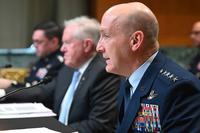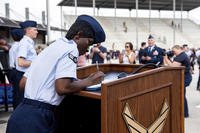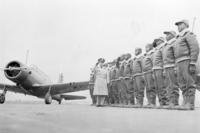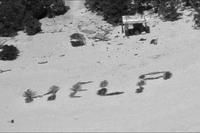The Defense Department ruled out Monday any military-to-military cooperation with Iran on fighting the militants of the Islamic State of Iraq and Syria (ISIS) who have taken over major northern Iraqi cities.
"It's not happening," said Rear Adm. John Kirby, the Pentagon press secretary. The United States has "no intentions, no plans to coordinate military activities with Iran."
Kirby spoke following remarks by Secretary of State John Kerry that appeared to suggest that the U.S. was open to discussing military coordination with the Iranians to drive out the ISIS extremists who reportedly have engaged in mass executions.
"I think we are open to any constructive process here that could minimize the violence, hold Iraq together, the integrity of the country and eliminate the presence of outside terrorist forces that are ripping it apart," Kerry said in an interview with Yahoo! News.
State Department spokeswoman Jen Psaki later said that U.S. negotiators might discuss the crisis in Iraq on the sidelines of nuclear talks with the Iranians in Vienna, but "we're not talking about military coordination or cooperation."
U.S. and Iranian military cooperation would have been unthinkable before the onslaught by ISIS, but last Saturday Iranian President Hassan Rouhani spoke to the possiblity.
"We are ready to help Iraq within the framework of international law, and if the Iraqi government and nation ask us to do so, we will consider it," Rouhani said.
"America hasn't acted on this situation yet," Rouhani said. "Whenever the United States makes a move on the ISIS, then we can think about cooperation with them in Iraq."
The discussion of a possible role for Iran came as ISIS reportedly took another town in northern Iraq. Using weapons seized from the fleeing Iraqi military, ISIS fighters captured Tal Afar, an ethnically mixed town of 200,000 that straddles the highway to Syria, Mayor Abdulal Abdoul told The Associated Press .
In 2006, the Army's 3rd Cavalry Regiment under the command of then-Col. H.R. McMaster occupied ethnically-mixed Tal Afar and offered the town to visitors as an example of the success of the counter-insurgency strategy.
Iraqi military officials in Baghdad denied that Tal Afar had fallen and said fighting was continuing to drive out the ISIS elements.
The U.S. has moved the carrier George H.W. Bush and two support warships into the Persian Gulf for possible airstrikes against ISIS. On Monday, the amphibious ship Mesa Verde with five MV-22 Opsrey tilt-rotor aircraft aboard joined the Bush strike group to aid in the evacuation of the U.S. embassy in Baghdad, if necessary.
At the State Department, spokeswoman confirmed that additional military personnel and State Department security personnel had arrived at the embassy, but she declined to give numbers.
Without giving specifics, Psaki also said that some embassy personnel had been relocated to safer U.S. consulates in northern Irbil and southern Basra but there were no plans to evacuate the Embassy.
"Our embassy is open and operating," Psaki said, but personnel were temporarily suspending work on the processing of visas.
The embassy, the largest and most expensive U.S. diplomatic facility in the world, was built at a cost of more than $700 million and contains housing areas, conference rooms, cafeterias, recreational facilities, offices, and even gardens for the employees living and working inside.
Those who live and work in the embassy rarely venture outside the blast walls of the "green zone" into the "red zone" that is the rest of Iraq.
-- Richard Sisk can be reached at richard.sisk@monster.com




























